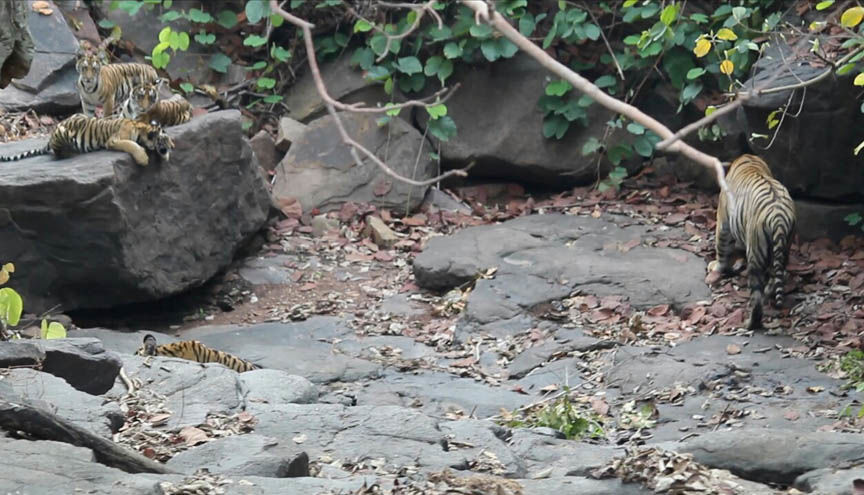Panna, Madhya Pradesh
On May 15, a six-year-old tigress died in Panna National Park, due to unknown reasons, leaving behind four cubs not more than eight months old. They were found three days after the tigress died.
Officials of the Panna Tiger Reserve, about 370 kilometres from the state capital Bhopal, were in a quandary about the welfare of the orphaned cubs. The cubs could either be removed to a protective enclosure where they could be brought up, nourished and looked after, or they could be left in the jungle to fend for themselves.
The first option, while it might protect the cubs, would be nothing short of imprisonment for them and deprive them of an upbringing in their natural habitat. The second option of leaving them in the jungle was also not without terrible risks and considerable danger. They were still too young to fend for themselves. But the decision was soon taken out of their hands.
Also Read: Operation Durga Vahini to capture and move a tigress and her cub from Kerwa
What happened next was nothing short of a miracle. The forest officials at the tiger reserve in Madhya Pradesh were astounded and excited to witness the reversal of gender roles in the animal kingdom!
The father of the cubs, P-243, stepped in, and was so strongly protective towards the four cubs that the officials decided to leave the cubs in his care, giving them the opportunity to grow up in their natural habitat. So far, the father and his cubs have displayed impeccable behaviour.
“After the death of the tigress, the tiger has been spotted in the same area where the cubs are. He has not moved out of the area,” Uttam Kumar Sharma, field operator, Panna Tiger Reserve, told Gaon Connection. Observing the protective behaviour of the tiger, the park authorities have decided to leave the cubs in the jungle.
Also Read: When women forest officers run a zoo
Amazingly, the cubs have taken to strolling the jungle with their father and are never far away from him, said Sharma. “Besides keeping a watchful eye on the cups, P-243 is also getting them food to eat,” he added.
Fathering the cubs
It is unusual for a male tiger to show any inclination or interest in bringing up his cubs. Very rarely do the tigers assume the responsibility of rearing the cubs. But, the tiger called P-243, the father of the cubs is doing just that.
After the tiger was observed moving with the cubs, a radio collar was put on P-243. This has enabled the park rangers to keep tabs on the movement of not just the tiger, but also the four cubs.
According to the forest officials, if the tiger continues to look after the cubs for a few more months, once they are a year old, they will be able to fend for themselves and hunt for their own food.
If this experiment of leaving the cubs in the wild with their father in charge is successful, it will disprove the theory that male tigers could kill vulnerable cubs that are orphaned by the death of their mother. So far P-243 has been behaving like the perfect Dad, they say.
जंगल से राहत की खबर…
— GaonConnection (@GaonConnection) May 24, 2021
पन्ना टाइगर रिजर्व पार्क में बाघिन की मौत के बाद 4 शावकों का रखवाला बना नरबाघ
संबंधित खबर- https://t.co/ptWIo75wkS
वीडियो साभार- PTR, #MadhyaPradesh #Tiger #WildAnimals pic.twitter.com/k9rIw5HjBJ
Tiger T-25 of Ranthambore
P-243’s paternal concern for the cubs has drawn responses of delight from many quarters.
“A decade ago, a similar story had unfolded in Rajasthan’s Ranthambore National Park,” R Srinivas Murthy, former director of the Panna Tiger Reserve and the initiator of the Panna Tiger Reintroduction Programme, told Gaon Connection.
“In 2011, a tigress died at Ranthambore National Park, Rajasthan, leaving behind two cubs,” Hanumanth Singh, former member of the state wildlife board, told Gaon Connection. Tiger T-25 brought them up. T-25 died last year, Singh said. “Chief Minister Ashok Gehlot had tweeted about it,” he said. The two cubs, adult tigresses now, are at the Sariska National Park, Rajasthan, he added.
World Network of Biosphere Reserves
The Panna Tiger Reserve has implemented several successful schemes and innovative experiments to restore the population of the tigers. It has attracted not just wildlife enthusiasts from across the world but also researchers.
Last year, the Panna National Park was included in the World Network of Biosphere Reserves under UNESCO’s Man and Biosphere (MAB) Programme. These include internationally designated protected areas, each known as biosphere reserves, that are meant to demonstrate a balanced relationship between people and nature. This is very much in step with the Sustainable Development Goals.
Meanwhile, on May 22, a video film was made showing P-243 cavorting with his cubs. The four cubs looked healthy and happy as they played with their dad. They are seen walking on the heels of their father and sitting around him on the top of a cliff. P-243 has also been spotted sharing his kill with the cubs.
Two trained elephants and a few forest staff are keeping a close eye on the family of five.
Read the story in Hindi.


















